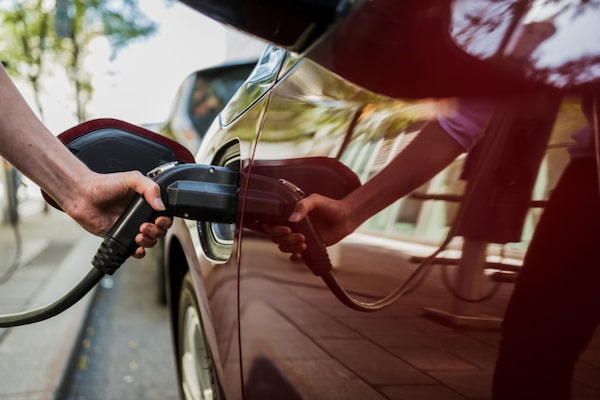
Imperial Oil and FLO Services have signed an agreement that could expand Canada's EV charging network.Services FLO Inc./Handout
Imperial Oil Ltd. IMO-T and electric-vehicle-charging company FLO Services Inc. have signed an agreement that would expand Canada’s EV charging network.
Details of the plan are still being hashed out, but it would see chargers installed at Imperial’s Esso and Mobil stations and an agreement to transfer carbon credits under federal clean-fuel regulations. Those rules aim to reduce greenhouse-gas emissions from transportation fuels consumed in Canada.
Louis Tremblay, president and chief executive officer of Quebec-based FLO, said in an interview that the agreement with “the most trusted brands in Canada” will help lower emissions while – he hopes – bringing EV chargers to every Canadian community.
What if Canada could have a bigger oil and gas industry, and lower emissions? It’s possible
“They want and we want to be part of the energy transition,” he said. “They are looking for solutions and we are a major player in Canada, so we joined forces to make sure we can offer those charging solutions.”
In 2021, only about 5.2 per cent of all vehicle sales in Canada were zero-emissions vehicles. But a record deployment of EVs and renewable energy around the world is expected to help prevent a surge in global carbon dioxide emissions from fossil-fuel combustion this year.
The International Energy Agency, a Paris-based energy watchdog, forecast in a report this week that emissions will grow by just under 1 per cent this year – only a small fraction of their increase in 2021. According to the analysis, released Wednesday, CO2 emissions are on course to increase by close to 300 million tonnes in 2022, compared with the nearly two-billion-tonne spike in 2021 owing to the world’s recovery from the economic crisis triggered by the COVID-19 pandemic.
And even though the energy crisis sparked by Russia’s invasion of Ukraine, which has propped up global coal demand by making natural gas far more expensive, the IEA said that the “relatively small increase in coal emissions has been considerably outweighed by the expansion of renewables.”
As a result, the carbon-intensity of the world’s energy supply is set to improve slightly this year, “resuming a years-long trend of consistent improvement that was disrupted last year by the emissions-intensive economic recovery” from the pandemic.
IEA executive director Fatih Birol said that the global energy crisis has “prompted a scramble by many countries to use other energy sources to replace the natural gas supplies that Russia has withheld from the market.”
“The encouraging news is that solar and wind are filling much of the gap, with the uptick in coal appearing to be relatively small and temporary,” he said in a statement.
“This means that CO2 emissions are growing far less quickly this year than some people feared – and that policy actions by governments are driving real structural changes in the energy economy. Those changes are set to accelerate thanks to the major clean-energy policy plans that have advanced around the world in recent months.”
In Canada, for example, the federal government has set a target for all new light-duty cars and passenger trucks to be zero-emission by 2035.
Solar and wind power are leading the increase in global renewable electricity generation in 2022, according to the IEA, with more than 700 terawatt-hours set to come online this year – the largest annual rise on record. And despite the challenges that droughts in several regions have posed for hydropower, global output is also up year-on-year.
Demand for oil is also set to grow more than for any other fossil fuel in 2022. Related emissions are likely to increase by around 180 million tonnes, driven largely by the aviation sector.
 Emma Graney
Emma Graney